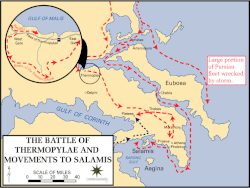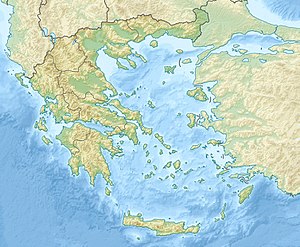
Back معركة أرطيميسيوم Arabic آرتمیزیوم دؤیوشو AZB Битка при Артемизион Bulgarian Bitka kod Artemizija BS Batalla d'Artemísion Catalan Bitva u Artemísia Czech Schlacht bei Artemision German Ναυμαχία του Αρτεμισίου Greek Batalla de Artemisio Spanish نبرد آرتمیزیوم Persian
| Battle of Artemisium | |||||||
|---|---|---|---|---|---|---|---|
| Part of the Second Persian invasion of Greece | |||||||
 | |||||||
| |||||||
| Belligerents | |||||||
| Greek city-states | Achaemenid Empire | ||||||
| Commanders and leaders | |||||||
| Strength | |||||||
|
| ||||||
| Casualties and losses | |||||||
| 100 ships lost | 400 ships lost | ||||||
Location of the naval battle of Artemisium | |||||||
The Battle of Artemisium or Artemision was a series of naval engagements over three days during the second Persian invasion of Greece. The battle took place simultaneously with the land battle at Thermopylae, in August or September 480 BC, off the coast of Euboea and was fought between an alliance of Greek city-states, including Sparta, Athens, Corinth and others, and the Persian Empire of Xerxes I.
The Persian invasion was a delayed response to the defeat of the first Persian invasion of Greece, which had been ended by the Athenian victory at the Battle of Marathon. King Xerxes had amassed a huge army and navy, and set out to conquer all of Greece. The Athenian general Themistocles proposed that the Allied Greeks block the advance of the Persian army at the pass of Thermopylae and simultaneously block the Persian navy at the Straits of Artemisium. An Allied naval force of 271 triremes was thus dispatched to await the arrival of the Persians.
Approaching Artemisium towards the end of summer, the Persian navy was caught in a gale off the coast of Magnesia and lost around a third of their 1200 ships. After arriving at Artemisium, the Persians sent a detachment of 200 ships around the coast of Euboea in an attempt to trap the Greeks, but these were caught in another storm and shipwrecked. The main action of the battle took place after two days of smaller engagements. The two sides fought all day, with roughly equal losses; however, the smaller Allied fleet could not afford the losses.
After the engagement, the Allies received news of the defeat of the Allied army at Thermopylae. Since their strategy required both Thermopylae and Artemisium to be held, and given their losses, the Allies decided to withdraw to Salamis. The Persians overran and gained control over Phocis, then Boeotia, and finally entered Attica where they captured the now-evacuated Athens. However, seeking a decisive victory over the Allied fleet, the Persians were later defeated at the Battle of Salamis in late 480 BC. Fearing being trapped in Europe, Xerxes withdrew with much of his army to Asia, leaving Mardonius to complete the conquest of Greece. The following year, however, saw an Allied army decisively defeat the Persians at the Battle of Plataea, thereby ending the Persian invasion.
